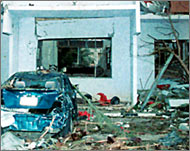Saudi regime v al-Qaida: Only one survives
The deadly bomb attack on a housing complex in Riyadh represents the latest battle between the Saudi Arabian monarchy and its armed opponents in a war to eliminate the other.

Just a year ago, the Riyadh government was still insisting – on the record – there was no al-Qaida presence in the country.
Bearing in mind 15 of the 9/11 hijackers were alleged to be of Saudi origin, this denial rang hollow with the rest of the world.
The truth is quite different. The crackdown on suspected members of underground opposition was in place long before Saudi admitted last summer, publicly, it had a problem.
Dozens of plots have been allegedly foiled and scores of suspected armed dissidents have been arrested or killed in confrontations.
But Saturday night’s bombing, which has killed at least 17 people and left more than 100 wounded, is the third such attack in the past six months.
Two devastating bombings of residential compounds in May killed 35 people – a month after Saudi-born dissident Usama bin Ladin exhorted his followers to rise up against the Riyadh government.
Fuelling support
Political dissidents say the Saudi government, an undemocratic monarchy that has long rejected calls for more transparent representative government, fuels support for al-Qaida by crushing all dissent.
“It’s a myth to say their supporters are just frustrated, unemployed or poor young men, or have psychological problems, “ says Dr Saad al-Faqih, London-based leader of the opposition Islamic Reform Movement. “Many are quite wealthy and comfortable.”
Supporters of groups such as al-Qaida are motivated by political and religious leaders, he told Aljazeera.net. Usually, they begin merely by seeking greater democracy and transparency.
“But the Saudis don’t allow freedom of expression,” he says, “and when people try to express their anger, they are crushed. The regime is basically telling them they have two choices: either they can remain as slaves, or they have to turn to violence.”
Soft targets
Al-Qaida’s choice of targets may seem counterproductive – even more so in the case of Saturday’s attack on a compound inhabited mostly by Arabs.
 |
|
An injured child and resident of |
“If it turns out that most of the casualties are Arabs … there will be an adverse reaction across the region,” says Dr Rosemary Hollis, head of the Middle East Programme at the Royal Institute of International Affairs, in London.
But several private residences belonging to the Saudi royal family were reportedly nearby, as were the US and other foreign embassies – all much more heavily guarded but close enough to make a point.
Analysts say such targets present al-Qaida with an opportunity to destabilise the regime, sending a message that it is too weak to provide security.
“It will deliver a shock to the economy, deter foreigners coming to work and investment,” says Hollis. “In this way, they hope to undermine the regime.”
Sympathy
Many Saudis have been disturbed by the increasingly bloody conflict. According to the government, several suspects have been turned in by their families which they believe shows al-Qaida’s support is waning.
 |
|
The al-Muhaya bombing killed at |
The May bombings led to a surge of support for the authorities, which al-Faqih says the government manipulated to great effect. But the Saudis, says Hollis, have found themselves facing a classic dilemma.
“It’s always a fact when authorities confront insurgents, or violent opponents, if you become too heavy-handed, you create new problems,” she says. “The Saudis face quite a task.”
Al-Faqih says the authorities quickly squandered public sympathy for the victims and the subsequent support for the government’s response through its oppressive tactics.
And the Saudis’ persistent crackdown on any dissent, such as recent pro-democracy protests, has fuelled resentment of the monarchy and support for al-Qaida.
“Recent images of riot police beating women protesters just adds to this support,” says al-Faqih.
Controversial
None the less, the choice of such targets – Saturday’s attack produced bloody television images of wounded women and children – remains controversial not only for al-Qaida’s supporters but for many armed insurgents as well.
|
“There are those who will say anyone killed will become a martyr to the cause, not a child killed in a random act of violence” Dr Rosemary Hollis, |
Hollis says in such circumstances there will be some even among al-Qaida’s ranks who will regard such an attack as a mistake or politically counterproductive.
“But there will be others who will reconcile this to their consciences,” she says.
“There are those who will say anyone killed will become a martyr to the cause, not a child killed in a random act of violence.”
Inevitable violence
And such violence casts a morbid shadow over Saudi Arabia’s future. Al-Faqih says the prospect of a peaceful resolution is impossible because the monarchy is too unpopular to survive a transformation into a more open democratic regime.
“The moment they allow more transparency and freedom of expression, this will lead to their demise,” al-Faqih says. “So they can only introduce cosmetic changes, not real reforms. This makes a clash inevitable.”
Although one of al-Qaida’s purported aims was to rid the kingdom of US troops, who departed this summer, the presence of American advisers and intelligence staff remains unacceptable for the radical group, says al-Fakih. The regime remains a US puppet in many people’s eyes, he says.
In his taped messages, Usama bin Ladin has made it clear how he sees the war between al-Qaida and the House of Saud will end.
“We expect for the ruler of Riyadh the same fate as the Shah of Iran.”